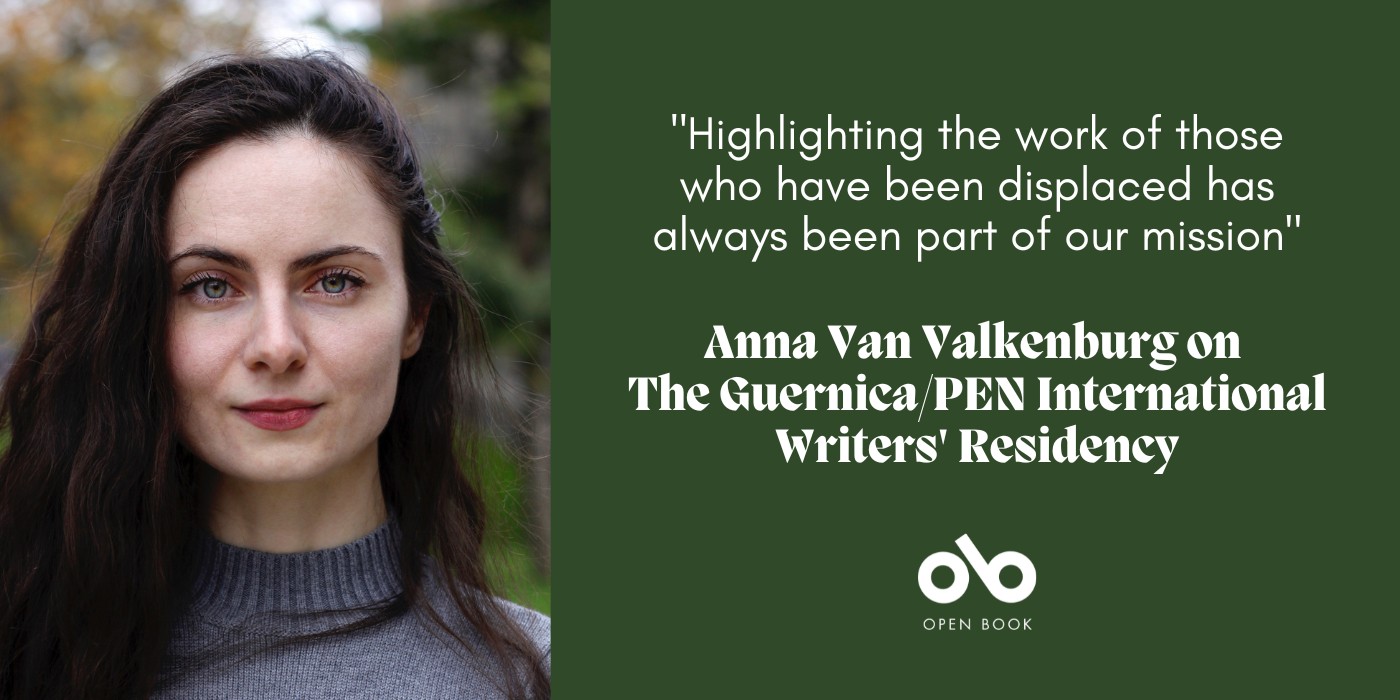“Guernica Stands With You" Anna Van Valkenburg on Guernica/PEN International's New Residency for Writers at Risk
In early 2023, Guernica Editions, together with PEN International, launched The Guernica/PEN International Writers' Residency, a unique virtual residency aimed at supporting writers in exile, refugee writers, and others who are at risk. The three month residencies are globally focused, welcoming writers working anywhere in the world to apply for the support and encouragement provided by the position.
Guernica has already welcomed their first writer in residence, Belarusian poet Hanna Komar, and plans are in place for more.
The programme was born from conversations between Guernica's Associate Publisher Anna Van Valkenburg and PEN International's Head of Development, Paul Julien, when Van Valkenburg was publishing acclaimed Ukrainian writer Ivan Baidak’s novel (In)visible in English translation last fall. Together they realized they wanted to do more for writers facing similar barriers, and soon the residency programme was on its way to becoming a reality.
Anna joins us today to discuss the programme, including its inception and its future, and the value and function of residencies for writers. She tells us about how supporting writers at risk is a natural fit with Guernica's mission since its founding (right down to the press' motto) and how the virtual aspect of the programme creates increased accessibility.
Open Book:
Tell us a little bit about how and why the residency came to be.
Anna Van Valkenburg for Guernica Editions:
Guernica has been publishing books by refugee writers and writers in exile since the beginning: Ava Farmehri’s novel Through the Sad Wood Our Corpses Will Hang; Ivan Baidak’s (In)visible, which we released this past Fall; Bänoo Zan’s Songs of Exile; John Mikhail Asfour’s English translation of Faraj Bayrakdar’s Mirrors of Absence; Asylum/Ransomed, a book of interviews with 16 Canadian refugees by Laura Swart. These are just a few. Highlighting the work of immigrant writers, of refugee writers, of those who have been displaced somehow, whether by choice or by force, has always been part of our mission as a press.
Now, when our current moment is especially fraught—war in Europe, repression of demonstrations in favour of women’s rights in Iran, natural disasters taking place within the context of the climate crisis, the countless other human rights abuses worldwide, all contribute to a sense of instability —we felt pulled to create a program which would support writers at risk.
We thought, “what kind of program can we create to help writers at risk that would be as global as realistically possible within our capacity?” We came up with a virtual writing residency that would support a writer at risk from anywhere in the world for three months in order to help them make progress on their creative projects.
OB:
How did Guernica and PEN connect to make this happen? Why was PEN the right partner for this initiative?
AVV:
I was in touch with Paul Julien, the Head of Development at PEN International, when we were launching Ivan Baidak’s novel (In)visible last fall. Initially, we were just talking about this book, but a conversation began about how we could continue collaborating. Our missions are very much aligned. PEN works to defend writers’ freedom of expression. In line with our motto, “No Borders, No Limits”, we support daring voices that are pushing boundaries and defying political, social, religious, and geographic conventions. The writers that PEN is supporting are often risking their lives or risking persecution by writing the very books that Guernica strives to bring into the world.
Your CanLit News
Subscribe to Open Book’s newsletter to get local book events, literary content, writing tips, and more in your inbox
I had told Paul Julien about the idea for this program, which we had just brainstormed briefly up to that point, and he was really enthusiastic about it.
OB:
Tell us a little bit about how the virtual aspect of the residency works and why it’s an essential element.
AVV:
A physical residency crossed my mind, but that would create two big complications. One is the cost of running a physical residency, which is beyond our capacity at this point as an independent publisher. The other is the logistical issues associated with asking writers who had recently left their home countries to now travel somewhere else for a residency. The writers that the program has been created for are either in exile, or fled their countries for their own safety, or haven’t yet left but are hoping to, or perhaps can’t even leave but are instead under house arrest and being watched closely. The virtual format allows us to make this program as accessible as possible and inclusive of writers in various situations.
With a virtual program, we’re not able to offer a writing ‘space’ directly. So we’ve come up with ways that will help writers in residence participate in the Canadian literary community in a virtual setting.
In the spring, we’ll be running a virtual event featuring our first writer in residence, Hanna Komar. Hanna will also be contributing pieces to our blog throughout the residency, which readers will be able to access and interact with. We’ll be helping her connect with the Canadian literary community as best as we can and become a part of the Canadian literary landscape during the residency. We’re looking for other creative ways to help her chronicle the residency.
OB:
Providing the residency opportunity is something you’re passionate about. What kind of value does a residency hold for writers? Why are residencies important?
AVV:
Residencies give authors the time and space to write. The number one constraint that authors everywhere have is that they have too little time to work on their creative projects. They have jobs and families and other responsibilities, and writing has to fit in somewhere.
Here the issue is magnified, since writers at risk are worrying or recently had to worry about their basic needs being met, about their safety, sometimes about staying alive.
On another level, residencies hold some kind of prestige. When an author gets chosen to be a writer in residence, an external organization stands behind that author and says that their work is worthy of recognition and that they’re backing it. Apart from financial support, what we’re able to give these writers is our name and say, “Guernica stands with you and supports your right to express yourself freely”.
OB:
Looking down the road, where would you love to see this initiative in five or ten years?
AVV:
We’re able to run the program this year thanks to funding we received from Ontario Creates. Provided that we’re able to secure a steady stream of funding for this program, which is my hope, I would love to see this expanding into a fruitful and supportive community of writers from across the world—a global Guernica community—who we can support through the residency, and who will stay in touch and continue to support each other.
I’d be thrilled if we could eventually run multiple residencies annually. But that’s all dreams for now. We’re just really excited and looking towards this first residency taking place in the spring.
After the first residency, we’re going to sit down for a brainstorm session with PEN International to see what’s working well, what could be improved, and how we can change and expand the program going forward.
__________________________________________________________
For more information about Guernica Editions, please visit their website.
For more information about PEN Canada, please visit their website.







